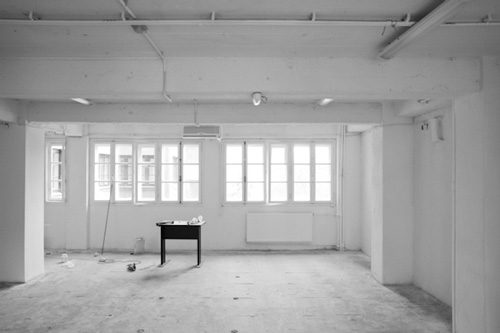Roaming. On file
dal 27/6/2013 al 27/6/2013
Segnalato da
Sigurour Atli Sigurosson
Ermanno Cristini
Alessandro Di Pietro
Irena Lagator
Giancarlo Norese
Andrea Palasti
Alice Pedroletti
Luca Scarabelli
The Bureau of Melodramatic Research
Alina Popa
Irina Gheorghe
Paolo Tognozzi
Alessandro Castiglioni
Ermanno Cristini
27/6/2013
Roaming. On file
Platforma Space - MNAC annex, Bucharest
Roaming wants to deal with the archive, focusing the attention its effects on identity. The first effect of burocracy is the control of identity.The archive underlying this control is a finite collection and indexing. The archive of the bureaucracy is a tool for flattening identity because in his role of linguistic system it names the being as a closed form.

----english below
a cura di Alessandro Castiglioni, Ermanno Cristini
Sigurður Atli Sigurðsson, Ermanno Cristini, Alessandro Di Pietro, Irena Lagator, Giancarlo Norese, Andrea Palasti, Alice Pedroletti, Luca Scarabelli, The Bureau of Melodramatic Research (Alina Popa, Irina Gheorghe), Paolo Tognozzi
Photographs: Alice Pedroletti
Web: Simply.it
L’assunzione dell’archivio in ambito artistico costituisce una tendenza significativa della ricerca artistica contemporanea. Forme, procedure, modalità che per tradizione appartengono alla burocrazia vengono riempite di valenze espressive assumendo significati che trascendono il loro carattere strumentale.
La burocrazia è una forma gerarchica dello stato che per esercitarsi necessita anzitutto della costruzione di un archivio.
Secondo Derrida (Mal d’archive, une impression freudienne, Paris, 1995) l’etimo della parola deriva da Archè, “comando”: l’archivio è una “domiciliazione” che presuppone un “guardiano”, l’autorità che detiene il potere ermeneutico; e la burocrazia è l’esercizio di tale potere.
L’archivio dunque non è mai neutro ma costituisce un contenente la cui forma determina la qualità del contenuto. Da questo punto di vista l’archivio è un linguaggio a tutti gli effetti.
ROAMING vuole affrontare in tale ottica il tema dell’archivio, ponendo al centro la questione della ricaduta sull’identità.
Effetto primo della burocazia è il controllo dell’identità. L’archivio che soggiace a tale controllo è una raccolta e un’indicizzazione finita. L’archivio della burocrazia è uno strumento di appiattimento identitario perché nel suo ruolo di sistema linguistico nomina l’essere come forma chiusa.
Viceversa l’archivio, idealmente, costituisce una forma aperta essendo, come vuole Umberto Eco (La vertigine della lista, Milano 2012), la forma della lista un luogo che “suggerisce quasi fisicamente l’infinito”.
La burocrazia avvalendosi dell’archivio a suo fondamento in realtà ne nega la natura.
L’appuntamento di Bucharest si sviluppa intorno a questa ipotesi scandagliandola secondo tre punti di esservazione: le esperienze di denuncia della burocrazia come pratica di controllo, quelle dove l’archivio diventa strumento di ricostruzione identitaria e quelle che riflettono sul web e l’archivio come forma liquida.
----english
Curated by Alessandro Castiglioni, Ermanno Cristini
Sigurður Atli Sigurðsson, Ermanno Cristini, Alessandro Di Pietro, Irena Lagator, Giancarlo Norese, Andrea Palasti, Alice Pedroletti, Luca Scarabelli, The Bureau of Melodramatic Research (Alina Popa, Irina Gheorghe), Paolo Tognozzi
Photographs: Alice Pedroletti
Web: Simply.it
The intake of the archive in the arts is a significant trend of contemporary artistic research. Forms, procedures, methods that traditionally belong to the bureaucracy are filled with expressive values assuming meanings that transcend their instrumental character.
The bureaucracy is a hierarchical form of the state that needs to practice first and foremost the construction of an archive.
According to Derrida (Mal d'archive, une impression freudienne, Paris, 1995), the etymology of the word comes from Archè, "command": the archive is a "clearance" which presupposes a "guardian" means the authority which holds hermeneutic power, and the bureaucracy is the exercise of that power.
The archive therefore is never neutral but constitutes a containing the shape of which determines the quality of the content. From this point of view the archive is a language to all effects.
ROAMING wants to deal with the archive, focusing the attention its effects on identity.
The first effect of burocracy is the control of identity.The archive underlying this control is a finite collection and indexing. The archive of the bureaucracy is a tool for flattening identity because in his role of linguistic system it names the being as a closed form.
Viceversa the archive, ideally, is a form being opened, as required by Umberto Eco (The vertigo of the list, Milan, 2012), the form of the list a place that "almost physically suggests the infinite."
The bureaucracy making use of the archive at its foundation in fact denies its nature.
The meeting in Bucharest is built around this assumption, analyzing it under three different view points: the experiences of denunciation of the bureaucracy as a practice of control, those where the archive becomes an instrument of identity reconstruction and those that reflect on the web and the archive as liquid form.
Platforma Space - MNAC annex
Calea Mosilor, 62-68 (1ft floor) - Bucharest



